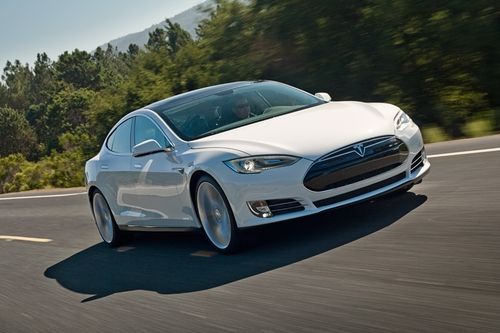Tesla Motors is continuing to rack up steep losses, so a prediction of profitability by next year may strike one as lunacy, until you look at the orders on hand and the projection of sales volume required to break even.
Tesla Motors CEO Elon Musk is again repeating his claim that Tesla Motors will be profitable in 2013, according to a Dow Jones report published today. Given the company’s current burn rate as it ramps up production of the Tesla Model S and X electric cars this may be a bold claim, but it is one he has made before. The claim rests on the assumption that manufacturing, orders and purchases of Tesla’s high end electric cars will proceed as expected.
At the June 2012, Elon Musk went over the numbers and explained the reasoning behind this prediction. However there continues to be a large “short interest” in Tesla Motors’ stock indicating there is a large number of stock traders betting against the company.
In 2012 and 2013 the company will be selling only the Model S, and expects to sell 5,000 units in 2012, and 20,000 units in 2013. The Tesla Model X is expected to go to manufacturing in 2014. This means that during 2012 and 2013 the company expects to sell 25,000 units of the Model S, and the price for that car ranges from the neighborhood of $50,000 to over $100,000 depending on options selected. I expect the “sweet spot” in the Model S line is the mid-range model with SuperCharger.
How likely is it that actual sales will reach this projected volume? In June, Elon Musk disclosed the company had over 10,000 reservations in hand for the Model S. The remainder presumably would go to those who are not currently reservation holders, but will decide to buy sometime in the coming months.
What happens if the company only sells 10,000 Model S’s? In other words, what if the company does not meet the sales projections? After all, the other electric car makers are having a hard time meeting sales projections, so it’s fair to think Tesla might also fall short. Musk said in June that the break-even point (cash flow positive) for the company is reached at sales of only 8,000 Model S’s.
Therefore with 10,000 orders in hand, and the break-even point reached with 8,000 vehicles sold, one begins to see Musks’ reasoning. That “break even” is a slam-dunk, and all Tesla needs is to find other willing customers and the company will be profitable.
In the future, as the Model X goes on sale in 2014, the company expects sales volume to reach 35,000 units per year which would be a 2% market penetration in the luxury car market. The company has plenty of room to grow, because it already owns a factory that had a production capacity of 500,000 vehicles per year when the GM/Toyota partnership owned that plant. Tesla can grow manufacturing capacity at a lower cost than if they had to find a new facility to manufacture each new vehicle.
As the company discloses in its financial filings with the SEC, there are a lot of “if’s” to consider. The company has very little experience in manufacturing complete cars, there are doubts about customer adoption, and so forth. One big question would be which direction will the price of oil take. Will it continue rising, or will something occur to decrease the price of oil. For example the price of oil was rising to worrisome heights in 2008, until the financial meltdown struck and the price of oil plummeted. Electric cars are most popular when the price of oil is high.
In the meantime the company is racking up glowing reviews for the Model S, and amazing performance in race conditions. By that measure the Model S should prove popular with potential customers, and perhaps Musks’ sales prediction will remain true.
Originally published at TorqueNews https://www.torquenews.com/1075/tesla-ceo-elon-musk-predicting-tesla-motors-profitability-2013
- Is there enough Grid Capacity for Hydrogen Fuel Cell or Battery Electric cars? - April 23, 2023
- Is Tesla finagling to grab federal NEVI dollars for Supercharger network? - November 15, 2022
- Tesla announces the North American Charging Standard charging connector - November 11, 2022
- Lightning Motorcycles adopts Silicon battery, 5 minute charge time gives 135 miles range - November 9, 2022
- Tesla Autopilot under US Dept of Transportation scrutiny - June 13, 2022
- Spectacular CNG bus fire misrepresented as EV bus fire - April 21, 2022
- Moldova, Ukraine, Georgia, Russia, and the European Energy Crisis - December 21, 2021
- Li-Bridge leading the USA across lithium battery chasm - October 29, 2021
- USA increasing domestic lithium battery research and manufacturing - October 28, 2021
- Electrify America building USA/Canada-wide EV charging network - October 27, 2021
















